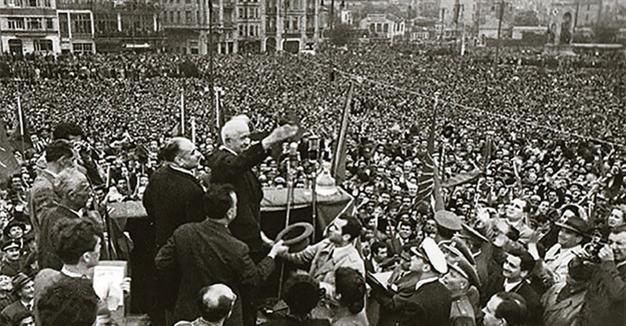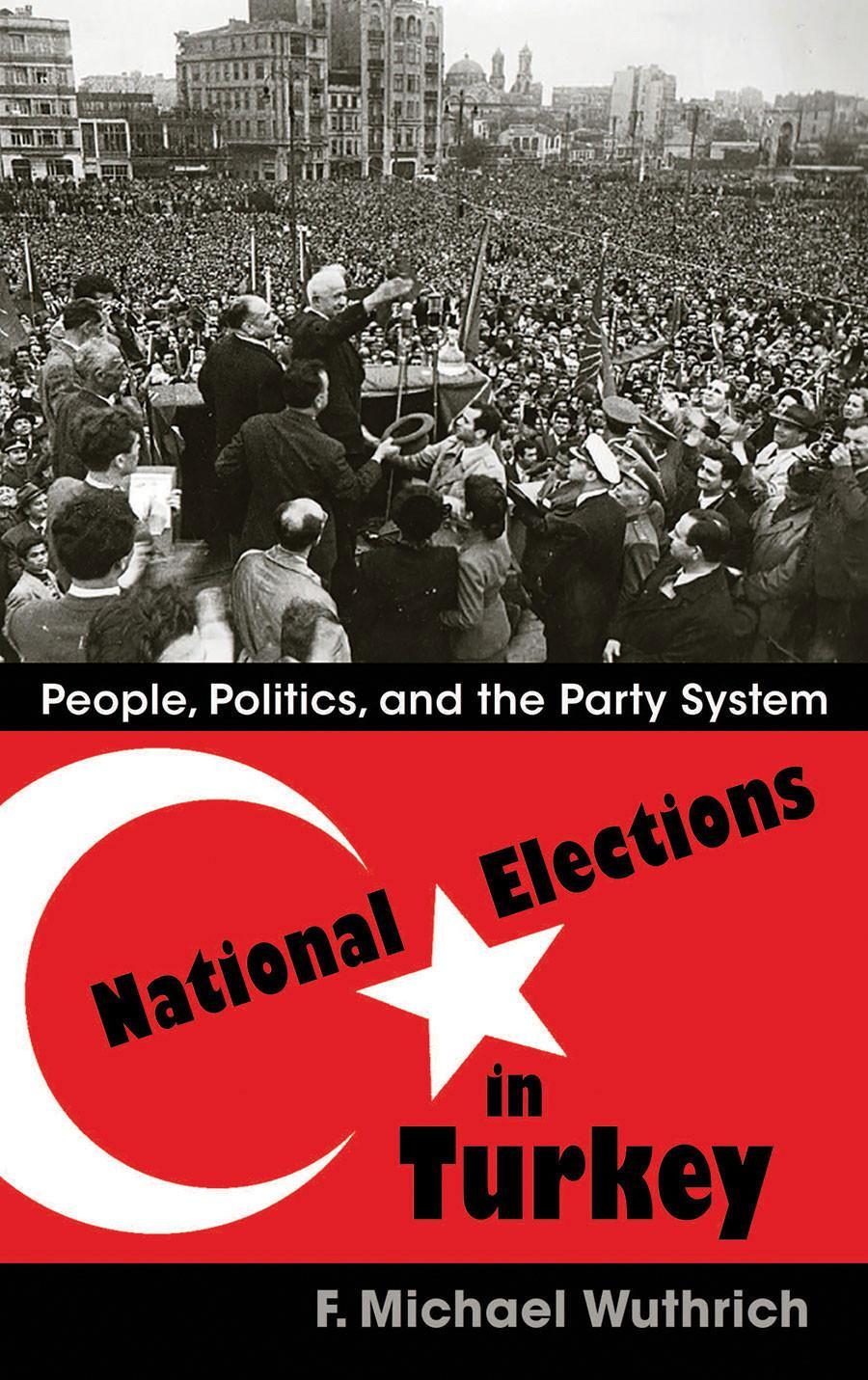Elections in Turkey: People, politics, and the party system
William Armstrong - william.armstrong@hdn.com.tr
 ‘National Elections in Turkey: People, Politics, and the Party System’ by F. Michael Wuthrich (Syracuse University Press, 341 pages, $49)
‘National Elections in Turkey: People, Politics, and the Party System’ by F. Michael Wuthrich (Syracuse University Press, 341 pages, $49)
What motivates Turkish voters? According to some, Turkey’s modern political history can be neatly explained as a struggle between religious, less-educated citizens and their secular, Western-oriented, more educated rivals. Turkish elections manifest a stable battle between the ideological “left” and “right,” an essential social cleavage in which religious and secular worldviews fight it out. Variations on this center-periphery theme have been stubbornly persistent since the sociologist Şerif Mardin first proposed it in 1973.

“National Elections in Turkey: People, Politics, and the Party System” by Michael Wuthrich is a thoroughgoing demolition of the center-periphery idea. The University of Kansas political scientist describes Mardin’s thesis as “indisputably one of the foundational works on Turkish politics, and arguably the most influential single work.” But he dismantles it through close examination of Turkey’s election campaigns, social shifts and party platforms since 1950. “While culture and religion have played greater or lesser roles in the system at various points,” he writes, “their general influence has nearly always been secondary.” Essential historical cleavages “initially appear to provide a simple and clear portrait of Turkish society, but do not conform to empirical observation.” Decision-making among voters has typically been more mundane and more local.
The book opens in 1950, the year of Turkey’s first free national election. The main contenders were the Democrat Party (DP) led by Adnan Menderes and the Republican People’s Party (CHP) of İsmet İnönü, which had ruled throughout the single-party era from 1923. Today, the DP is commonly seen as the first blow landed by the “periphery” against the state-secularist center: The first representative of a tradition that would persist through various right-wing parties and later political Islamists. Menderes is remembered as the champion of the “common man” in a lineage that leads to current President Recep Tayyip Erdoğan.
Wuthrich problematizes this narrative. The 1950 election was largely an “intra-elite conflict,” he writes. The leaders of the top parties competing in the 1950s were all originally members of the CHP during the single-party years: “They all would have been considered social elites, easily distinguishable from the general public in terms of educational attainment, professional status, or wealth.” Rather than parties forming to represent new or different segments of society, existing sociopolitical elites competed with one another for the votes of newly important peripheral segments of the population.
Examination of the DP and CHP’s election strategies through the 1950s further complicates the center-periphery dichotomy. The CHP “relied on campaign discourse rather than face-to-face contact and interaction with the masses, but their discourse was not elitist or particularly ‘statist,’” Wurthrich writes. “Especially in 1950 and 1961, CHP election programs were crafted to be read by a broad spectrum of society and explicitly emphasized the concerns of villagers and urban workers.”
Electoral maps from the time show that vote distribution bore zero relation to a center-periphery cleavage. The CHP won most votes in the less developed, less centralized east of the country, while the DP won in the western provinces that are today “secular bastions” of the CHP. Local factors were of much greater significance than national campaigns in shaping voters’ political allegiance. The CHP, Wurthrich writes, had “greater success in areas where it could mobilize ‘proxies’ – that is, local notables – many of whom had developed connections with the state during the single-party period or earlier. The notable became a client of the party, and in turn, utilized his existing patronage network within the local community to mobilize votes.” As a result, CHP votes “came largely from the provinces in the far eastern regions and, later, from the fertile Mediterranean provinces where such arrangements were a much greater possibility due to the area’s relative lack of centralization.” In a reversal of the center-periphery paradigm, the less developed a region the more likely it was to support the CHP.
The DP, on the other hand, enlisted local professionals to visit towns and villages as party representatives to determine what local voters wanted and then to make related promises. Local notables that were influential enough to mobilize voters in the less developed east “could not exert much influence upon the more modern peasantry of the west, who were more responsive to the leadership of provincial merchants and professionals.” Western provinces therefore opted overwhelmingly for the DP, delivering national power to the party in three consecutive general elections.
The 1960 military coup interrupted the machine politics perfected by the DP. But the Justice Party (JP) of Süleyman Demirel took over the DP’s mantle once elections resumed, similarly prospering in western regions. Nevertheless, the establishment of the State Planning Organization (DPT) in the 1961 constitution constrained the JP’s strategy. The DPT took developmental spending out of the hands of the government and placed it in the lap of bureaucrats, cutting off the valve for pork barrel spending by ruling parties. Demirel was able to win in 1965 but the JP lost votes in subsequent elections as the new constraints meant it could not fulfill the role of the DP.
Meanwhile, the CHP’s electoral success under Bülent Ecevit in the 1970s was based on increased attention to and contact with the non-elite masses. As urbanization accelerated in the late 1960s and 1970s, Ecevit’s CHP managed to woo poor new arrivals to major cities. These voters responded favorably to a party that had an expressed plan to address their needs and was willing to interact with them face to face. The CHP’s secular leftist outlook was not the primary concern of its supporters, who voted based on practical material concerns. Again, the center-periphery metanarrative makes no sense when applied to this era.
The CHP harvested the votes of struggling city dwellers in the 1970s. But after the 1980 military coup, a window of opportunity opened for political Islam. The rise of the Welfare Party under Necmettin Erbakan was founded in local government and community organizations delivering aid to poor urban communities. By providing help to citizens on the tough urban periphery, Islamist groups built up solid constituencies of support, succeeding in previous leftist strongholds. In the words of Wuthrich, this “cannot be understood as a radical religious transformation of constituents on the left, but rather that this segment of the electorate considered the Welfare Party to more closely embody the type of populist, social welfare party they were hoping for.” While political rivals fixated on outbursts of wild opinion by Erbakan, these controversies only distracted them from how the RP was mobilizing voters through bread-and-butter issues and grassroots organization.
The current ruling Justice and Development (AKP) inherited the mantle of the RP. Many people still vote for the AKP based on the perception that it is the only party with a realistic prospect of “getting things done.” But as Wuthrich suggests, the practical-minded character of the party’s early years (helped immeasurably by monopolistic access to state largesse) has recently been overtaken by highly ideological, identity-based Islamist rhetoric. That transformation has not done the AKP any electoral harm, creating a dangerous incentive dynamic that thrives on polarization, bitterness and a fierce culture war. “Sociocultural identities, issues and cleavages have come to play a role in national campaign discourse at a level never before encountered in elections in Turkey,” Wuthrich writes.
One oversight in this book is that it barely addresses the systematic crushing of the left by the post-1980 coup regime. This was crucial because it indirectly gave Islamists an open goal when planting grassroots operations in the vacuum on the urban periphery where leftist groups and unions used to be. Wuthrich’s failure to dwell on this stands out in an otherwise fastidious study.
But on the whole this is a very impressive book with a rich, complex understanding of Turkish politics. Both Islamists and secularists alike are seduced by the mistaken idea that today’s political divides are part of timeless, unchanging cultural schisms. In fact, divides that today seem unshakeable depend on particular present-day circumstances. The current political zeitgeist in Turkey may seem hopeless, but it is not condemned to remain forever thus.
Follow the Turkey Book Talk podcast via iTunes here, Stitcher here, Podbean here, or Facebook here.
 ‘National Elections in Turkey: People, Politics, and the Party System’ by F. Michael Wuthrich (Syracuse University Press, 341 pages, $49)
‘National Elections in Turkey: People, Politics, and the Party System’ by F. Michael Wuthrich (Syracuse University Press, 341 pages, $49) “National Elections in Turkey: People, Politics, and the Party System” by Michael Wuthrich is a thoroughgoing demolition of the center-periphery idea. The University of Kansas political scientist describes Mardin’s thesis as “indisputably one of the foundational works on Turkish politics, and arguably the most influential single work.” But he dismantles it through close examination of Turkey’s election campaigns, social shifts and party platforms since 1950. “While culture and religion have played greater or lesser roles in the system at various points,” he writes, “their general influence has nearly always been secondary.” Essential historical cleavages “initially appear to provide a simple and clear portrait of Turkish society, but do not conform to empirical observation.” Decision-making among voters has typically been more mundane and more local.
“National Elections in Turkey: People, Politics, and the Party System” by Michael Wuthrich is a thoroughgoing demolition of the center-periphery idea. The University of Kansas political scientist describes Mardin’s thesis as “indisputably one of the foundational works on Turkish politics, and arguably the most influential single work.” But he dismantles it through close examination of Turkey’s election campaigns, social shifts and party platforms since 1950. “While culture and religion have played greater or lesser roles in the system at various points,” he writes, “their general influence has nearly always been secondary.” Essential historical cleavages “initially appear to provide a simple and clear portrait of Turkish society, but do not conform to empirical observation.” Decision-making among voters has typically been more mundane and more local.